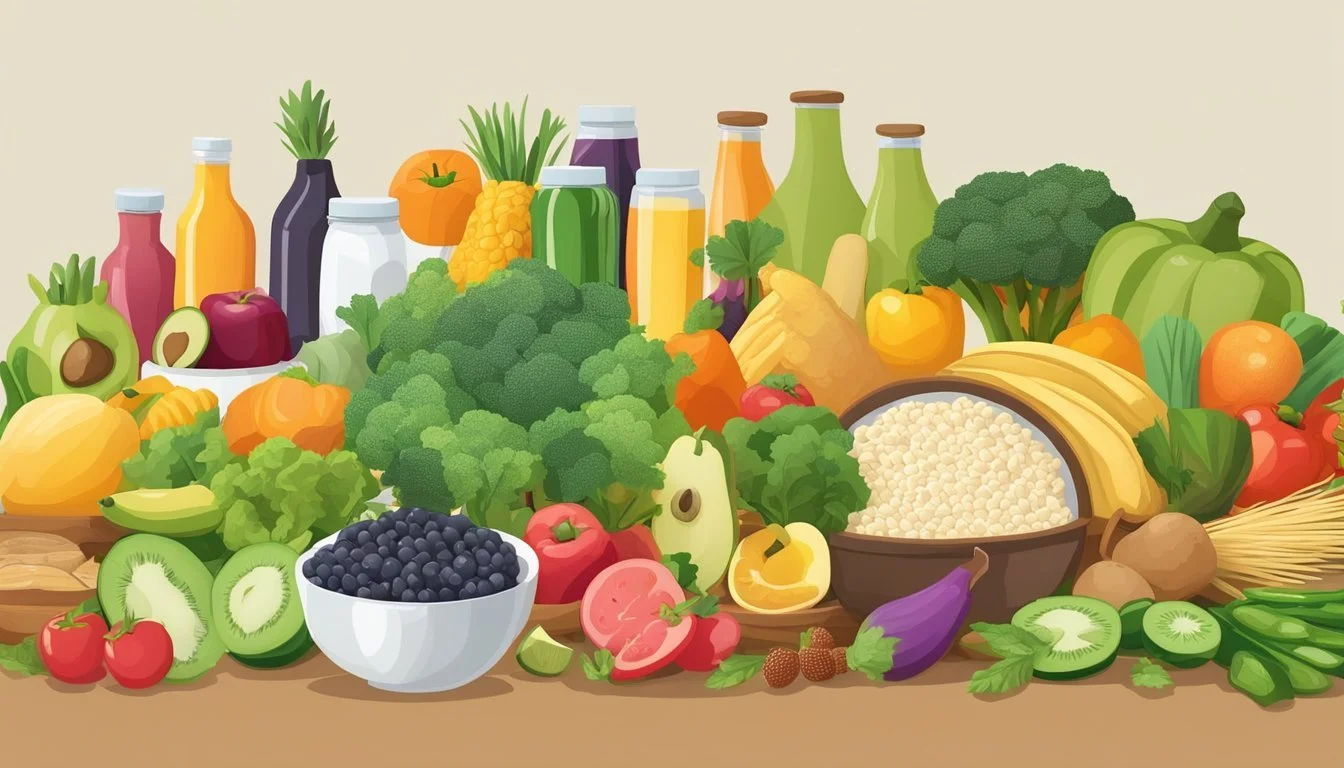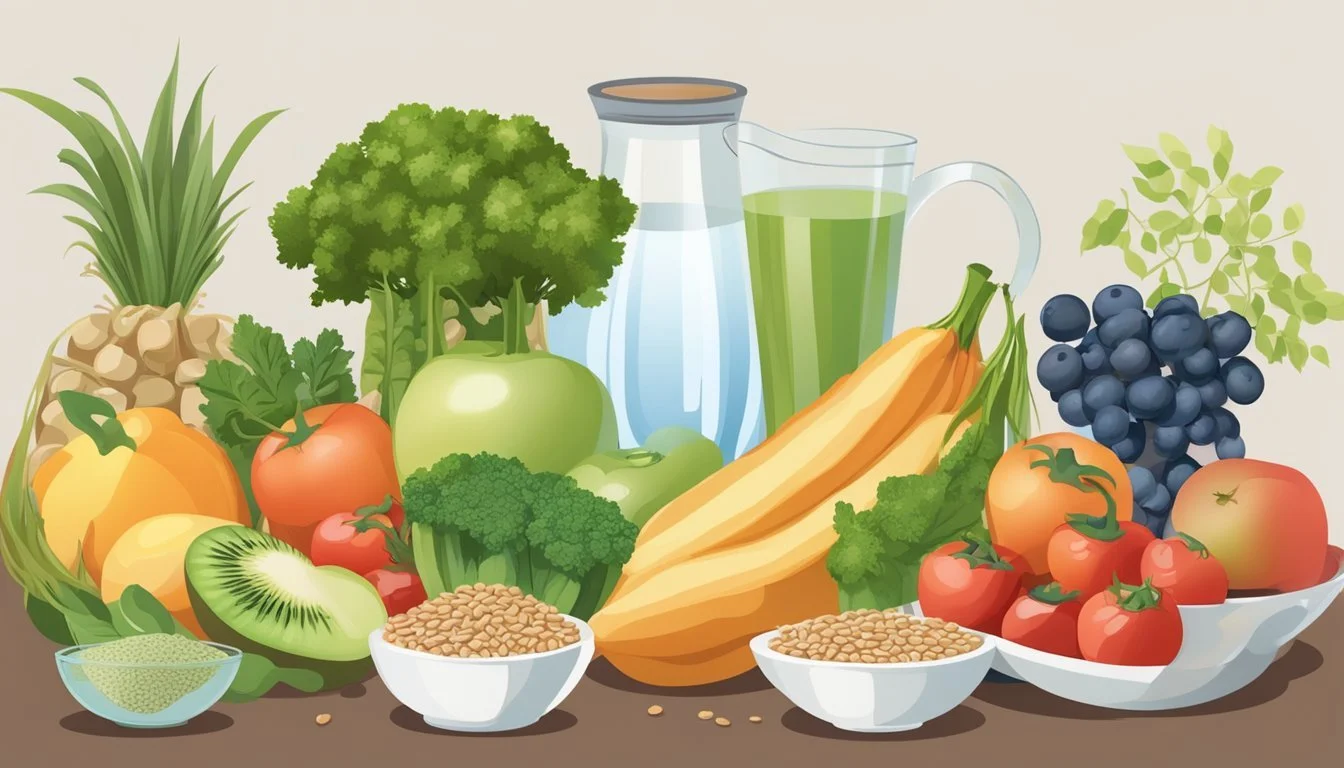Power Foods That Nourish Your Body and Boost Long-Term Health
The food we consume plays a critical role in our overall well-being, influencing not just physical health but also mental and emotional states. By making informed choices about our diet, we can enhance our daily energy levels and improve the quality of our sleep, leading to better overall health.
Understanding how specific foods impact our energy and sleep can empower individuals to make smarter dietary decisions. Incorporating certain foods into one's diet can aid in achieving a restful night's sleep and maintaining alertness throughout the day.
1) Spinach Salad
Spinach salad offers a nutritious and versatile option for any meal. Fresh spinach leaves serve as the base, providing a rich source of vitamins A, C, and K, along with iron and calcium.
Adding a variety of toppings can enhance both flavor and nutritional value. Sliced apples, hard-boiled eggs, and feta cheese are popular choices that complement spinach well.
Dressings made from balsamic vinaigrette or lemon juice pair nicely, adding tang without overwhelming the greens.
Nuts, such as pecans or almonds, introduce a crunchy texture and healthy fats. These components make spinach salad not just tasty, but also filling and balanced.
Simple to prepare, this salad is suitable for a quick lunch or a light dinner, making it a convenient option for busy days.
2) Avocado Toast
Avocado toast has become a popular and versatile dish enjoyed by many. It combines the creamy richness of ripe avocados with the satisfying crunch of toasted bread.
To make a basic avocado toast, start with a good, sturdy bread like sourdough or whole-wheat. Toast the bread until it's golden and crispy.
Next, take a ripe avocado, cut it open, remove the pit, and scoop out the flesh. Mash the avocado in a bowl with a fork until it reaches your desired consistency. Spread the mashed avocado evenly over the toast.
Adding a pinch of salt enhances the flavor of the avocado. Some people also like to drizzle a bit of extra virgin olive oil on top for added richness.
Variations of avocado toast can include a range of toppings. Fresh herbs such as basil, cilantro, or parsley work well. For a bit of spice, sprinkle some chili flakes or a dash of hot sauce.
Another popular addition is a poached or fried egg placed on top. This adds protein and makes the toast even more filling. For a burst of freshness, consider adding sliced tomatoes or radishes.
Garlic can also be a wonderful addition. Lightly rub a peeled raw garlic clove over the toast before adding the avocado, or mix a pinch of garlic powder into the avocado. This adds a subtle yet aromatic flavor.
With its combination of flavors and textures, avocado toast remains a go-to meal for any time of the day.
3) Greek Yogurt with Berries
Greek yogurt with berries offers a nutritious and tasty way to start the day. It's a combination rich in proteins, vitamins, and probiotics. Greek yogurt itself is a powerhouse, loaded with calcium, protein, and vitamin B12.
Berries add natural sweetness along with a boost of antioxidants and fiber. Popular options such as strawberries, blueberries, and raspberries provide a variety of vitamins and minerals. The inclusion of different berries can enhance the flavor and nutritional profile.
Adding nuts to this mix can introduce healthy fats and more protein, improving satiety. A drizzle of honey can add a touch of natural sweetness without significant added sugars.
Greek yogurt with berries is versatile. It can be eaten as breakfast, a snack, or even a dessert. The probiotics in Greek yogurt also support digestive health, making this option beneficial for the gut.
4) Quinoa Bowl
Quinoa bowls have become a popular choice due to their versatility and nutritional benefits.
These bowls often combine quinoa with various vegetables, proteins, and dressings. Quinoa itself is rich in protein, fiber, and essential amino acids, making it a nutritional powerhouse.
One popular variation includes roasted sweet potatoes, black beans, and a creamy avocado sauce. The combination of these ingredients provides a balance of flavors and textures that appeal to many.
Another favorite is the Mediterranean quinoa bowl, which typically includes ingredients like cherry tomatoes, cucumbers, olives, and feta cheese. This mix not only adds vibrant colors but also delivers a refreshing taste.
For those preferring a spicier option, curried coconut quinoa with greens and roasted cauliflower presents a flavorful alternative. Cooking the quinoa in coconut milk and adding Indian spices create a warm and comforting dish.
Chicken quinoa burrito bowls are also an excellent meal prep option. The mix of chicken, beans, corn, and bell peppers captures the essence of a burrito in a healthier, deconstructed form.
Quinoa bowls can cater to various dietary preferences, including vegan and gluten-free diets. With so many variations available, they offer a convenient and nutritious meal option suitable for any time of day.
5) Grilled Salmon
Grilled salmon is a nutritious and flavorful dish that is easy to prepare. The process typically begins with preheating the grill to medium-high heat, around 375 to 450 degrees Fahrenheit.
Before cooking, the salmon fillets should be patted dry with paper towels. This ensures better adherence of marinades or seasoning, which can include a simple mix of kosher salt, pepper, and olive oil.
Marinating the salmon for about 30 minutes enhances the flavor. Popular marinades often consist of olive oil, lemon juice, garlic, and fresh herbs.
When ready to cook, grease the grill grates to prevent sticking. Place the salmon on the grill and cook for around 5-7 minutes per side, depending on the thickness of the fillets.
It is important to grill with the lid closed to maintain a consistent temperature. The salmon is done when it flakes easily with a fork.
Grilled salmon pairs well with a variety of sides such as grilled vegetables, quinoa, or a fresh salad. It is a versatile dish that can be customized to personal tastes, making it a favorite for many.
6) Chia Seed Pudding
Chia seed pudding is a simple, healthy, and versatile dish. Made by soaking chia seeds in liquid, typically milk or a milk substitute, it forms a thick, pudding-like consistency.
Chia seeds are rich in fiber, which aids in healthy digestion and helps maintain a balanced diet. Just a small serving can contribute significantly to daily fiber intake.
In addition to fiber, chia seeds are loaded with omega-3 fatty acids, which support heart health. These fats are essential for the body and can reduce the risk of heart disease.
Chia pudding is an easy way to incorporate these nutritious seeds into one's diet. The mild flavor allows customization with fruits, nuts, and sweeteners, making it a versatile snack or breakfast.
7) Roasted Brussels Sprouts
Roasted Brussels sprouts offer a delicious way to incorporate nutritious vegetables into meals. Basic preparation involves trimming and halving the sprouts. Adding a coating of olive oil, salt, and pepper enhances their flavors.
For additional taste, some recipes suggest incorporating garlic, balsamic vinegar, or even a touch of maple syrup. These ingredients can complement the natural flavors of the Brussels sprouts.
When roasting, spreading the sprouts in a single layer on a baking sheet ensures even cooking. The oven temperature can vary, with many recipes recommending heating between 400 to 475 degrees Fahrenheit. Baking time generally ranges from 18 to 30 minutes, depending on size and desired tenderness.
Roasted Brussels sprouts can be a versatile side dish for various main courses. They are not only easy to prepare but also nutritious, rich in vitamins and fiber. For those who prefer a simpler version, oil and salt are sufficient to bring out a satisfying taste.
Serving them immediately ensures they retain their crispiness, providing a delightful texture that complements their robust flavor.
8) Sweet Potato Fries
Sweet potato fries offer a healthy and tasty alternative to traditional fries. They are rich in vitamins, such as vitamin A and C, and provide plenty of fiber. These nutrients make sweet potato fries a nutritious addition to any meal.
For optimal crunchiness, it's recommended to soak the sweet potato strips in cold water for at least 30 minutes. This step helps remove excess starch, resulting in crispier fries. After soaking, the fries should be thoroughly dried to ensure they bake properly.
Preheating the oven to a high temperature, around 425°F to 450°F, helps achieve a better texture. Coating the sweet potato slices with a small amount of olive oil and seasonings like salt, pepper, paprika, or cinnamon before baking enhances their flavor.
For best results, arrange the fries in a single layer on a baking sheet to avoid overcrowding and ensure even cooking. Bake for approximately 20-25 minutes, turning halfway through to ensure even browning.
These fries make a great side dish or snack and can be paired with various dips or sauces to suit individual tastes.
9) Lentil Soup
Lentil soup is a nutritious and hearty meal that provides a range of health benefits. It is rich in protein, making it a valuable addition to a balanced diet, especially for vegetarians and vegans.
Preparing lentil soup involves simmering lentils with vegetables and spices. Common ingredients include onions, carrots, and celery. Adding herbs like thyme, bay leaves, and oregano enhances the flavor.
A well-made lentil soup often includes a mix of textures. Pureeing a portion can result in a creamy consistency while leaving some lentils whole retains a satisfying bite. Adjusting the blend allows for personal preference.
Ingredients such as olive oil, lemon juice, and vinegar can be added for extra zest and to balance flavors. Importantly, seasoning with salt and pepper should be done to taste, as it significantly impacts the final dish.
Lentils cook fairly quickly, usually becoming tender within 30 to 40 minutes of simmering. The soup is versatile and can be adjusted for dietary needs by incorporating different vegetables or spices.
Lentil soup is both comforting and nutritious, making it an excellent choice for a meal that supports overall health and well-being.
10) Green Smoothie
Green smoothies are an effective way to boost nutrient intake. They typically combine leafy greens like spinach or kale with fruits such as bananas, berries, and mango. These ingredients provide a variety of vitamins, minerals, and antioxidants.
By incorporating fiber-rich foods, green smoothies can aid digestion. Ingredients like chia seeds, flaxseeds, and avocados contribute to this effect. Fiber also helps to maintain satiety, making it easier to manage weight.
For those looking to maintain or lose weight, green smoothies offer a low-calorie yet filling option. Water and fiber content support metabolism and reduce the urge to snack between meals.
Another benefit is their versatility. Green smoothies can be customized to suit individual taste preferences and nutritional needs. Adding protein powder or Greek yogurt can enhance their protein content.
Liquid bases such as almond milk or coconut water can add hydration benefits. This makes green smoothies a practical choice for those with busy lifestyles, ensuring they receive essential nutrients on the go.
Incorporating green smoothies into daily meals can significantly enhance overall health.
Nutritional Benefits Of Food
Eating a variety of foods provides essential nutrients that play vital roles in overall health. Two main categories of these nutrients include vitamins and minerals, and antioxidants.
Vitamins And Minerals
Vitamins and minerals are essential for maintaining bodily functions, supporting the immune system, and promoting overall health.
For instance, Vitamin C found in oranges and strawberries helps in repairing tissues and boosting the immune system. Vitamin D, sourced from fatty fish and egg yolks, is crucial for bone health. Minerals like Calcium from dairy products aid in building strong bones and teeth.
Iron, available in red meat and spinach, is key for oxygen transport in the blood. Magnesium, found in nuts and seeds, supports muscle and nerve function. Including a mix of these vitamins and minerals in one's diet is crucial for sustaining energy levels and enhancing bodily functions.
Antioxidants
Antioxidants are compounds that help protect the body from oxidative stress and free radical damage. These substances are found in various fruits, vegetables, and nuts.
Vitamins C and E are well-known antioxidants. Vitamin C helps neutralize harmful free radicals and is abundant in citrus fruits and bell peppers. Vitamin E, present in almonds and sunflower seeds, protects cell membranes from oxidative damage.
Beta-carotene, another antioxidant, found in carrots and sweet potatoes, converts to Vitamin A in the body and supports vision health. Polyphenols, present in berries and tea, have anti-inflammatory properties. Incorporating antioxidant-rich foods into one's diet can help reduce the risk of chronic diseases and support a healthier aging process.
How Food Supports Physical Health
Proper nutrition plays a critical role in supporting an individual's physical health by providing the necessary energy and strengthening the immune system to fend off illnesses.
Energy Levels
Food serves as the primary source of energy for the body. Carbohydrates, proteins, and fats are essential macronutrients that fuel daily activities and bodily functions. Carbohydrates are particularly important as they break down into glucose, the body's main energy source. Consuming complex carbs like whole grains and vegetables ensures steady energy levels.
Proteins, composed of amino acids, help in the repair and growth of tissues. Lean meats, dairy products, and legumes are excellent protein sources. Fats, while often misunderstood, provide a long-term energy reserve. Healthy fats like those in nuts, seeds, and avocados are vital for brain function and cell structure.
Immune System
A balanced diet can enhance the immune system's ability to fight infections. Vitamins and minerals, such as vitamin C, vitamin D, and zinc, play crucial roles. Vitamin C, found in citrus fruits and green vegetables, boosts white blood cell production. Vitamin D, available in fish, fortified dairy, and sunlight exposure, supports immune response.
Zinc, present in meat, shellfish, and legumes, aids in the development of immune cells. Probiotics in yogurt and fermented foods maintain gut health, which is closely linked to immunity. Adequate hydration also helps in flushing out toxins and supporting overall immune function.
Emotional And Mental Benefits
Certain foods can have significant effects on mood regulation and cognitive function. Consuming nutrient-rich foods can help improve emotional well-being and mental sharpness.
Mood Regulation
Diet plays an essential role in regulating mood. Nutrient-dense foods such as fruits, vegetables, and fish high in omega-3 fatty acids, like salmon, are beneficial. These foods can help stabilize mood swings thanks to their high content of vitamins, minerals, and antioxidants.
Dark leafy greens such as spinach and kale are particularly effective due to their magnesium content, which helps reduce anxiety levels. Nuts and seeds provide a good source of tryptophan, an amino acid that aids in serotonin production, often referred to as the "feel-good" neurotransmitter.
Whole grains are another excellent choice as they slowly release glucose into the bloodstream. This helps to provide steady energy levels, reducing irritability and fatigue which can lead to mood swings.
Cognitive Function
Cognitive function is influenced significantly by diet, with certain foods enhancing mental clarity and focus. Omega-3 fatty acids, found in oily fish like mackerel and sardines, support neuronal function and improve synaptic plasticity.
Berries, particularly blueberries, are rich in antioxidants that protect the brain from oxidative stress and improve memory. Legumes such as beans and lentils contribute to prolonged cognitive stamina due to their protein and fiber content.
Green tea contains L-theanine, an amino acid that promotes relaxation without drowsiness. This often results in improved attention and focus. Dark chocolate with a high cocoa content can also enhance cognitive function due to its flavonoid content, which increases blood flow to the brain.
By incorporating these foods into their diet, individuals can support both mood regulation and enhanced cognitive function.




